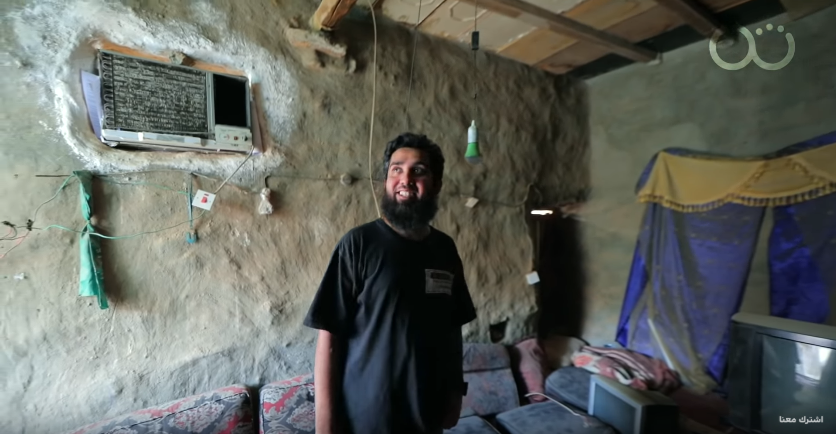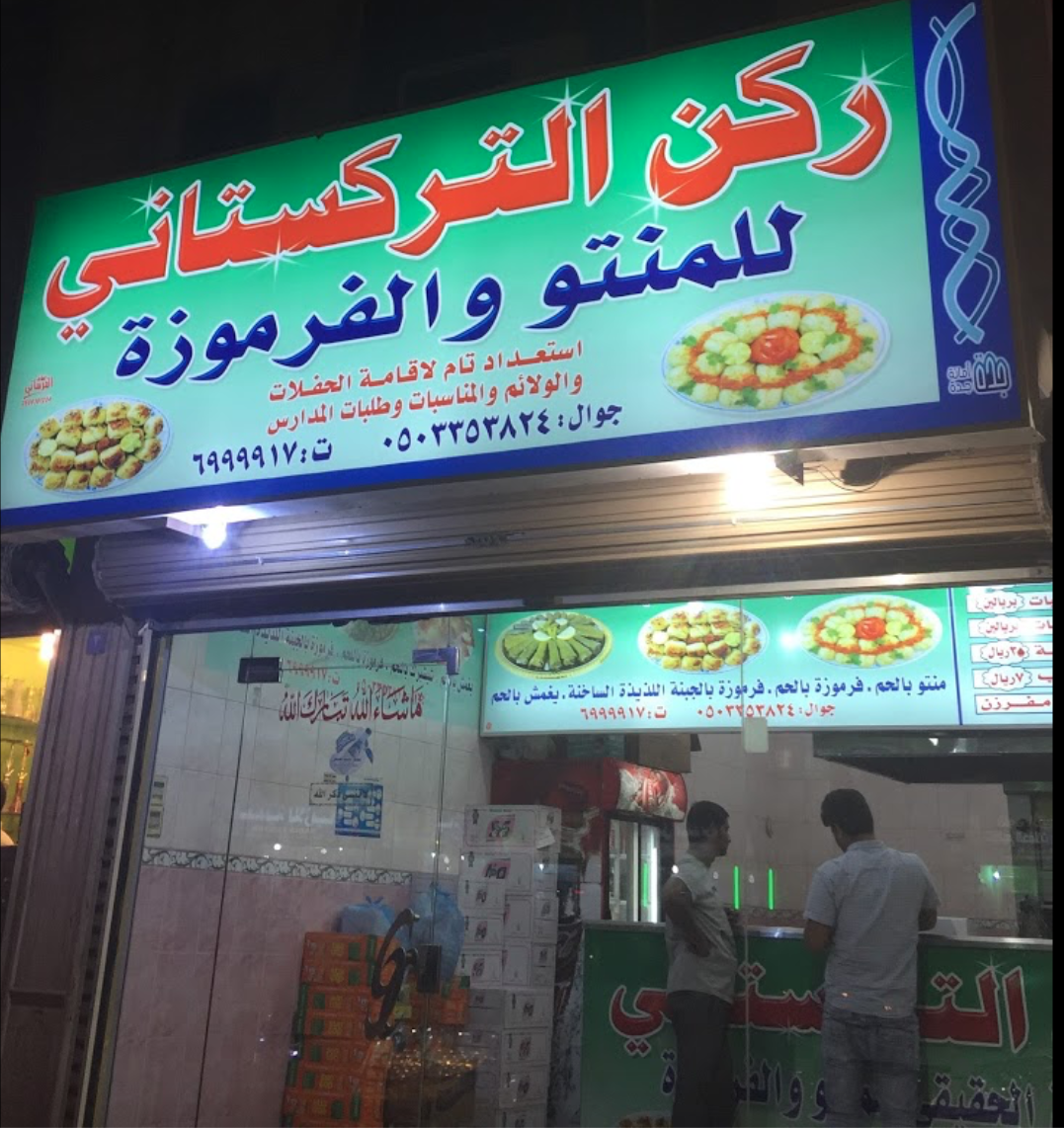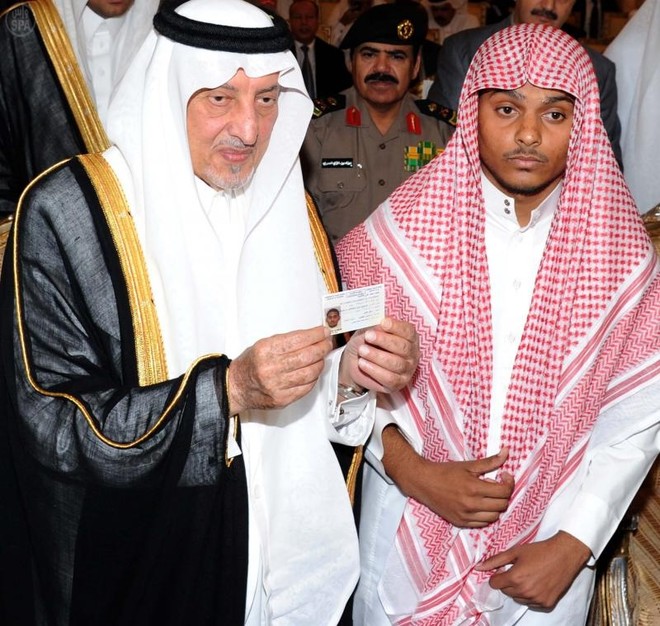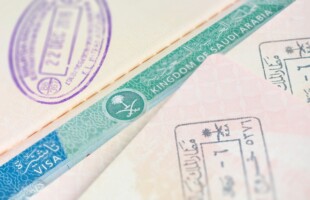No Saudi that meets Salman believes he is a Pakistani citizen. Born in Saudi Arabia to migrant parents, Salman speaks an impeccable Najdi Arabic dialect and is acutely cognizant of Saudi culture and norms. Many of his childhood memories are similar to his Saudi counterparts; he is a graduate of his local mosque’s Quran school and knows Riyadh like the back of his hand.
In a Saudi documentary titled Son of the Country, which focuses on Salman’s life, he affirms his Saudi identity, stating that he “memorises the Saudi national anthem … but not the Pakistani one” and adding that his parents named him after the current King of Saudi Arabia, King Salman (the then Emir of Riyadh Province).
Salman is met with incredulity when he encounters locals. They always ask him, “how come you are Pakistani?” Good humoured and patient, he provides them with a detailed explanation of his situation and narrates his life story to them. Few believe him. Some call him “a liar,” while many insist he is playing tricks on them.
The locals’ reaction is not surprising. Migrants in the Gulf are almost always perceived as temporary visitors. As Andrew Gardners puts it, “Gulf states and Gulf citizens alike reinforce the temporary nature of [migrant's] tenure in the GCC states, even though many foreigners stay for years, for a lifetime or in the case of some families, for generations." As such, for many Saudis, seeing and meeting Salman throws the essentialist image of migrants, especially non-Arab migrants, into question.
Gulf media and entertainment play an important role in solidifying a perceived difference between all migrants and citizens. The latter are usually portrayed as deeply-rooted in their land. The former are temporary. A group of marginal figures or fleeting visitors who stumbled upon the land and will leave soon. Thus, migrants in the Gulf, by the virtue of their perceived transience, are thought of in public discourse as unable or disinclined to develop any sense of belonging to their host countries.
Salman’s everyday interactions with incredulous Saudis epitomise his lived experience and shapes his self-perceived identity. As Salman describes it: “I always felt [an outsider] … I did not know how to identify myself until recently. I used to ponder: Am I Pakistani? Am I Saudi? Am I American since I speak English from a young age? But I just recently discovered I am Salman and that is it. I do not need to overthink it. I am a human. I am who I make of myself.”
Pinning down one’s identity is a difficult enterprise. Identities are multiple, subject to change and situational. Migrants like Salman develop complex and creative strategies to navigate life in the Gulf through adopting new identities, distinguishing themselves from other migrants and reaffirming their sense of belonging to their host countries.
Reflecting on what he hears in the public sphere or private conversations, Salman says “feeling as [an outsider] in a country you were born and raised is sad.” He adds, “when someone says you have no rights, you are just like every other [migrant], it hurts a little bit if you think about it.” Salman, however, states without hesitation that his "wholehearted loyalty” is to Saudi Arabia and “Saudis, the good and the bad, are [his] people.”
There are, of course, signifiers of a Gulf (e.g., Kuwaiti, Bahraini and others) lifestyle, customs, and values that differentiate most locals from migrants. In fact, one can draw general contours of, say, Saudi culture or identity. However, such contours are always evolving and re-negotiated, in part as a reaction to the large presence of migrants in the Gulf. In Saudi Arabia, and to a lesser degree in other Gulf countries, many multi-generational migrants blur the line separating citizens and migrants, and affirm their adherence to local culture and norms. This can be seen through seemingly innocuous behaviour such as wearing Khaleeji clothes and rooting for local or national soccer teams or bold assertions and claims of belonging to the Gulf and/or equating themselves with local citizens.
By highlighting some stories of multi-generational migrants in Saudi Arabia, this article serves as a reminder of the heterogeneity of migrant workers in Saudi Arabia and the Gulf as a whole. It also calls on policymakers, journalists and most importantly academics and activists, to take into account the diverse spectrum of identities of Gulf migrants when discussing, covering or regulating migration and labour in the Gulf.
A Long History of Migration
A common misperception is that migration to the Gulf began only after the discovery of oil. While labour migration grew significantly because of oil wealth, Gulf countries were, long before the discovery of oil, “enmeshed in interregional relations with the peoples and places” in Asia and Africa “through pearl diving … [and] merchant trade networks.”
In addition to trade and other economic links, the Islamic holy sites in Arabia have always been a migration destination for Muslims. The rise of colonial aggressions in the 19th and 20th century accelerated the rate of migrants to Makkah and Madina. Many Muslims travelled to Saudi Arabia because they considered it a safe haven -- a holy site to seek a temporary refuge until the situation in their home countries stabilises. Those migrants came from different parts of the world, including Rohingya areas in Myanmar, Central Asia, Southeast Asia, Palestine and West Africa.
Today, the migrants who arrived in the country in the first half of the 20th century, and their offspring, form what is referred to in the Saudi media as Mawalid al-Saudia or the Saudi-Borns – a misnomer since many first-generation migrants were not born in the country. A better term to refer to this group would be Multi-generational Migrants (MGMs). According to some estimates, the MGM population range from one to two million. They reside primarily in Makkah, Jeddah, and Madinah.
Legal Status
Although no statistics are available, a considerable number of MGMs became naturalised citizens, most likely before the passage of the 1953 Nationality Law. It is not uncommon for one family to have a combination of citizens and non-citizens. Turkestani and Rohingya community leaders often identify their community as “a community of citizens and residents.” Some of those naturalised citizens became high ranking state officials, diplomats and ministers. Marriages between MGMs and Saudis are not uncommon. A local media report mentions that at least 7,000 Rohingya are married to Saudis (most likely of Rohingya ancestry).
It is important to note that Gulf governments play an essential role in shaping the lives and the identities of MGMs through laws, policies or public rhetoric that favour them over other migrants. Certain MGMs enjoy exemptions from the strict migration and labour laws in the Kingdom. For example, the Saudi Residency Law lists a number of groups entitled to permanent residency in the country including foreign wives of Saudis, Yemenis (removed from the list by a Ministerial decree in 1991) and people who moved to Saudi Arabia before 1952 from Central Asia.
Other exemptions are offered on a humanitarian basis. For example, in 2013, Saudi Arabia embarked on a massive “correction campaign” to provide permanent residency to 249,000 Rohingyas who had lived in the Kingdom for decades without identification papers.
Moreover, Palestinian, Rohingya and “Turkestani” residents hold a “special status” in the labour market: i) They are exempted from deportation and ii) They are not considered “foreign workers” in Nitaqat but are equal to only 0.25 points in the system (i.e., hiring four individuals with “special status” will equate to hiring one Saudi citizen).
Notably, residents with special status were not excluded from the newly-introduced dependents fees. However, private businesses hiring residents with special status are exempt from paying foreign workers recruitment fees (SAR 400 in 2018 per worker, which will increase to SAR 800 by 2020).
Other humanitarian gestures include accepting children of Palestinians (in 1983) and Rohingya (in 2013) in Saudi public schools (as a general rule, only Saudi students are accepted in Saudi public schools). Additionally, 121 private and charitable schools run by members of the Rohingya communities were put under the financial and administrative control of the Saudi Ministry of Education.
But for Salman and many other migrants who have grown up in Saudi Arabia and whose families have lived in the country for generations, none of these exemptions applies. For such groups, staying legally in the country is contingent upon maintaining an active work contract with a sponsor, through whom he or she obtains a visa and residency ID. If they lose their job or their sponsor chooses not to renew their contracts, they cannot renew their visa. Many MGMs choose to stay in the country despite lacking a valid visa or ID. Their irregular status means that if they are caught by security forces, they will be deported no matter how deep their roots are in Saudi Arabia.
Citizens Inwardly and Outwardly
There is a continuous process by which MGMs reiterate their sense of belonging to their host country and highlight differences between them and other migrant groups. This process is situational, continuously evolving and subject to diverse factors at a wide variety of social levels. Governments play a role in this process by exempting certain groups from labour and migration law restrictions, but individuals also deploy and manipulate these identities to assert loyalty and show gratitude to the host country. Loyalty and gratitude are often accompanied by claims of belonging and citizenship rights and welfare services.
In public appearances, many MGMs express their strong feelings of belonging to Saudi Arabia. The Rohingya community regularly runs campaigns to donate blood to the Saudi Army. Ilyas ‘Alim, a community representative, said these campaigns are “a part of our social responsibility” toward “this generous country where our parents and grandparents grew up.”
A statement by the Turkestani community in Saudi says that after moving to Saudi Arabia “King Ibn Saud opened the doors of this land to them and embraced them, they were blessed by safety, security, dignified life and real citizenship. Allah replaced their homeland with the best homeland. Saudi Arabia today is their original homeland physically and spiritually. They became citizens inwardly and outwardly.”
On an official visit by a delegation of the Turkestani communities to King Abdullah, a community representative gave a speech where he said: “We the Turkestanis, whether Saudis or residents, who are the offspring of this generous country … pledge that we are your loyal men when it comes to defending [you] and our beloved homeland.”
MGMs use opportunities of public appearance to highlight their deeply interwoven presence in the fabric of Saudi social and political life. They emphasise their expressions of loyalty to the nation just like any other Saudi national, reminding others that although they do not hold Saudi citizenship, they are as loyal as Saudi citizenship holders.
On a local TV station report, several MGMs were interviewed and asked to describe their sense of belonging after years of living in the Kingdom. They all emphatically shared their affinity towards Saudi Arabia, the only place they said they knew. A Chadian EM in a full Saudi attire told the interviewer, with a flawless Hijazi dialect, “I consider Saudi Arabia my home first and foremost … it runs in my blood.” He added that he “had never transferred money outside this blessed land,” differentiating himself from other migrant workers who remit portions of their salary to relatives in their home country (and are often vilified for it). Uncertain about his long-term stay in Saudi Arabia, he is still hopeful he will “get the chance to build a house in this country,” something only legally permitted to Saudis or few privileged expats.
Notably, many MGMs have undergone a slow assimilation process – adopting Saudi dialects, customs, lifestyle, national dress, and local beliefs. Ironically, some de facto Saudi policies facilitate this assimilation process. A large number of MGMs could not return to their countries of origin for political reasons and local law restricts associations that promote a distinct ethnic identity. As such, it was nearly impossible to maintain ties with their homeland.
Additionally, the Saudi government does not tolerate practising any “imported” forms of Islam. This led many migrants to adopt the local form of faith and practice, namely Salafi Islam, through assimilation and missionary work by Saudis. In fact, as religious nationalism was a defining feature of Saudi in the 20th century, adopting Salafi Islam by MGMs was one way of asserting belonging to the community. Many MGMs were able to obtain Islamic Studies education and seek jobs in the religious sector (e.g., Mosques, Ministry of Islamic Affairs, Muslim World League).
Though MGMs’ often integrate, their influence on Saudi social life and popular culture is also noticeable. Many Yemenis and Palestinians own businesses (through a Saudi sponsor), ranging from small shops to large corporations. Central Asian and Indonesian cuisine is a staple on many Saudi breakfast and dinner tables and wedding feasts. It is common to find Rohingya as imams, muezzins or caretakers in mosques in Makkah. Saudi football clubs recruit MGMs in their squads (one MGM counts as Saudi in the Saudi Professional League).
“Reaching for the Stars” or the Neoliberal Belonging
When asked what has Saudi Arabia given him, Salman answered: “opportunities.” He adds that “it is true I struggled to get where I am at now. All roads were not always open to me. But because I am from this country, I know there are more opportunities here than one can imagine.”
Salman’s life in Saudi Arabia is an inspiring tale of migrant resourcefulness and industriousness. He grew up in a dilapidated house in an old neighbourhood while his parents worked several jobs to survive. He attended the Pakistani International School until 5th grade before dropping out because his parents could not afford it. Using books collected from recycle bins, watching Sesame Street, joining Quran memorisation schools in the local mosque and his mother’s incessant effort, Salman said he was able to learn Arabic, Urdu, and English.
When Salman was 13, his father had a dispute with his sponsor. As a result, the father had to leave the country permanently. The family decided to stay in Saudi Arabia while waiting for him to find a job and join the family again but he never succeeded in securing a visa to Saudi Arabia. As such, Salman’s mother raised him and his brother alone. Seeing his mother put in long hours working several jobs to survive, Salman decided to help her by trying his luck in the job market. He sold Miswaks and toys outside mosques, worked in a flea market, a furniture store and a car dealership. When he was of legal age to drive, he was hired as a driver to a Saudi businessman, earning SAR 500 a month.
Struggling to advance further in the job market, and being rejected from the jobs he applied for because he has no diploma, Salman fabricated one. He was able to secure a job with the fake degree at Carrefour Saudi Arabia. Though he currently maintains a legal status in Saudi, Salman had at times struggled to keep his identification paper valid. After teaching himself web design and IT skills, he eventually found a job at the King Khalid Charity as an IT engineer where he currently works. Reflecting on his experience, Salman emphasises that despite the tough road ahead of anyone looking for a job, he said that in Saudi Arabia there are opportunities to “reach for the stars.”
Salman claims belonging to Saudi Arabia by espousing “discourses of neoliberal entrepreneurship.” He specifically highlights how, despite starting out with nothing, his dedication and determination led him to success in the free market in Saudi Arabia. In Salman’s eyes, this is not only an economic success. It also helps him assert his belonging to Saudi Arabia. Scholar Neha Vora noted that Indian migrants in Dubai, some of whom have been there for generations, echo similar sentiments to Salman. They acknowledge their exclusion from the citizenship and the welfare benefits that come with it, while at the same time, highlight their exemplary work ethic and knowledge of the country’s business environment to claim belonging to the UAE.
While Salman’s talent and hard work is commendable, it is important to note that his story of success is exceptional. His parents were able to spare some time and effort to homeschool him. He developed entrepreneurial skills at a young age. His trick of using a fake diploma worked without getting into legal troubles (forging a diploma is punishable by deportation in Saudi Arabia). Many MGMs like him will not have his luck or talent to succeed in a highly competitive and heavily regulated job market.
Being stripped of opportunities to get an education or jobs, a number of children of MGMs engage in jobs in the black market mainly running businesses without a license (few resort to selling drugs and alcohol, setting up an illegal business of recruiting runaway domestic workers or prostitution).
There are no statistics to show how many MGMs engage in illegal activities, nor is it estimated that a high proportion of them do so. However, the claim that migrants in Saudi Arabia have the opportunity to “reach for the stars” is somewhat misleading. It is based, in part, on a belief in neoliberal ideals that glorifies economic opportunities in Gulf economies, a privilege that most migrants, including many MGMs, can barely access.
If achievable, the “stars” can only be reached if serious reforms and policy changes take place. MGM children should have access to education. MGMs should be able to obtain legal status with no fear of deportation and have access to the labour market with no sponsorship system, and the right to own a business or get loans to start one. Without an inclusive government policy, MGMs will remain in precarious conditions and will have few avenues to seek or obtain a decent source of livelihood.
Media and Civil Society Rhetoric
Saudi media portrays MGMs positively for the most part. Media reports often highlight the MGMs’ similarities with Saudi citizens. A Linesport TV report described MGMs as Saudis in everything from “language, feelings of belonging, loyalty to religion.” An Alriyadh report states MGMs are “Saudi citizens but without citizenship … they are citizens because they love this country. Because they do not know a homeland other than this one. Because they never visited other countries including the ones they carry citizenship from. Because some of them their grandparents were born here. Because they plan to live their lives among us, while the migrant plans to collect as much money then leave.” Such reports criticise the unfair treatment MGMs receive in the labour market and advocate for the rights of MGMs to either obtain permanent residency or citizenship.
A similar line of advocacy is often echoed by activists, prominent writers, religious figures and government officials. The advocacy is motivated by a combination of pragmatic factors and humanitarian and religious principles.
Citing the economic benefits of hiring MGMs as they do not remit money to their home countries, Fatima al-Ansari, an activist, called for exempting MGMs from sponsorship rules and giving them priority of hiring in the labour market. In an interview with Ya Hala TV show, Khalid al-Suliman, a writer in Okaz newspaper, advocated for giving MGMs permanent residency, stating that this is a “humanitarian” response to their legal status.
Relatedly, Mish’al al-Ali, a former member of the Consultative Council, reiterated al-Suliman’s sentiment and called for offering MGMs “temporary citizenship” as a short-term solution to their legal status. Additionally, Mohammad al-Arefe, a well-known preacher (21.4 Million followers on Twitter) said in a tweet that plenty of the EMs “are creative … intelligent, they love this country and they feel a sense of belonging to it … I hope they are given the Saudi citizenship.”
Despite the overall positive coverage of MGMs, they are not exempt from the xenophobia and bigotry that colours narratives on migrants. For example, when thousands of scabies cases were discovered in Makkah, it was attributed to Rohingya students that were recently integrated into the public school system. On another instance, an Okaz newspaper headline read “the Ministry of Health in Makkah is Chasing after 94 HIV-Infected Rhoying” while Erem News headline read “Panic Spread among Makkah Residents after 100 HIV-Infected Individuals Disappear between them.” After each these incidents, xenophobic social media hashtags such as “94 HIV-Infected Rohingya are on the Run in Makkah” trend on social media.
Such coverage and social media posts frustrated Ghanim al-Humar, a contributor to al-Sharq newspaper. He tweeted that “even after the ideas of extremist groups’ to expel non-Muslims from Arabia was defeated and long gone,” the Saudi people are now faced with “rude and disrespectful populist groups” that call for “the expulsion of Rohingya from Arabia.” Other writers such as Fatin Hussain wrote a thoughtful analysis in Makkah Newspaper defending Rhoyinga against the wave of accusations of being a source of disease. She instead asked everyone commenting on this issue to collaborate on fixing the underlying causes of disease among migrant groups, namely, marginalisation, poverty, and overpopulation.
The lives of MGMs in Saudi Arabia should serve as a great reminder that migrants across the Gulf are diverse. They moved to the Gulf for various reasons in addition to economic betterment. While Gulf laws attempt to make their presence in Gulf temporary, many have been living in the Gulf for generations. It is essential for journalists, policymakers, advocates, and academics to acknowledge the variety of experiences when speaking about migrants in the Gulf. Not only will that help us gain a better insight into the lives of migrants in the Gulf, but it will also help us design, and advocate for, well-informed policies and laws. More importantly, it will help deconstruct the stereotypes of migrants as temporary workers with no vested interest in their destination country or a sense of belonging to it.







